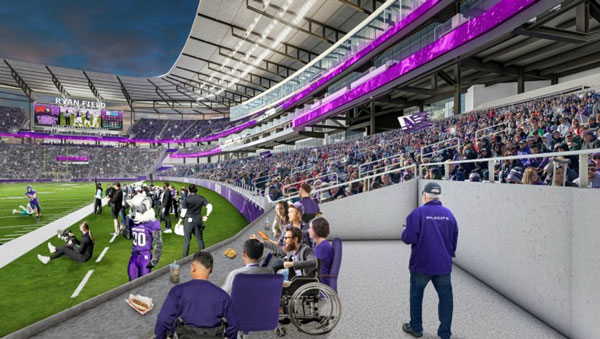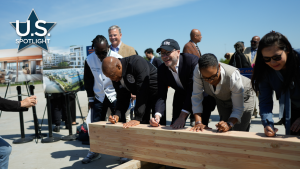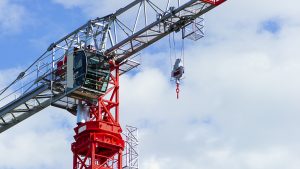Ryan Field, the 98-year-old home of the Northwestern University Wildcats Big 10 football team, located in Evanston, Ill., an almost 80,000 population suburb in the northern Chicago area, is being reimagined.
Demolition began in early February of the venerable but tired field and unlit 47,000 seat stadium for an entirely privately funded state-of-the-art new stadium, a project finally underway after considerable controversy.
No specific cost has been estimated, but the stadium will be partly funded by a $480 million donation by the university’s chief benefactor, the Ryan family of Patrick Ryan, former university chair and founder of insurance behemoth AON Corp.
While described as a “best in the nation football experience” the new Ryan Field will be considerably smaller in size, 35,000 seats. But it will have a futuristic streamlined look with an overhead canopy and loads of amenities.
According to a university press release, the new stadium will have the “best sightlines” in U.S. college football and will “set a new standard” for disabled accessibility using Universal Design standards.
Even time-honored tailgate parties will be accommodated on new expansive plazas without encroaching on the surrounding neighborhood. The venue will also be built to LEED Gold certification.
Moreover, the stadium is also being designed to have a minimal impact on the community for crowd noise and light pollution, owing to the rooftop canopy design. The stadium will be offset at ground level by a berm and green space.
Controversy over concerts
The community benefits component was a large reason civic leaders approved the project, the biggest in Evanston’s history. More than $10 million yearly will go towards developing tech skills among the local workforce and an additional $2 million will be generated in taxes and fee revenue.
The construction manager, Central Street Consortium, is a joint venture between Chicago-based Turner Construction Company and Walsh Construction. Turner is also leading construction of the Barack Obama Presidential center on Chicago’s south side.
The controversy over the new stadium wasn’t so much over the building of the stadium itself, though it is a major project for a small suburban city, but over the building’s amenities, especially hosting entertainment and concerts.
The city council, with Mayor Daniel Biss breaking the tie, voted 5-4 in November to allow the stadium to host a maximum of six concerts per year.
The concern for opponents was noise, traffic and crowd control. Hosting the concerts will help Northwestern maintain the stadium’s operations. But under a zoning change amendment the maximum sound can be 80 decibels or there’s a $50,000 fine. There’s a sound cutoff of 10 p.m. (with a grace period of 15 minutes) or a $30,000 fine with each additional minute costing $2,000.
Community benefits key to the project
Community benefits are “an important part of this conversation” city council member Jonathan Nieuwsma said.
He said the city-university relationship has “not always been wine and roses.”
But this redevelopment finally “allowed the city the once-in-a-lifetime opportunity to have some leverage with the university to encourage them to step up and participate financially in our community in a way that that they should have been, in my opinion, for years.”
The university, for example, as a non-profit, never paid property taxes yet obtained city services for free. Now, a 15-year commitment will see as much as $175 million, based on inflation, be funneled to the city, school district and for affordable housing and downtown assistance.

Moreover, the lead contractor has a solid track record of hiring minorities.
“This contractor has a very robust workforce development program,” Nieuwsma said.
This not just for bringing disadvantage populations into the workforce but “working with and mentoring minority-owned subcontractors and bringing them up to a level of operational efficacy where they are better placed to bid on projects such as the Obama Presidential Library, Ryan Field and any number of projects elsewhere.”
City council member Eleanor Revelle, whose ward the stadium is in, voted against the concert zoning amendment but said there are “definitely some downsides” to the stadium generally. She said rebuilding the existing stadium rather than building anew would have been more “sustainable. Concrete has a very big carbon footprint.”
The university says almost 3,000 jobs will be “supported” during the project and the new facility will have a $659 million economic impact on the city.
Demolition will take four months and the new stadium is expected to be completed for the 2026 football season.











Recent Comments
comments for this post are closed